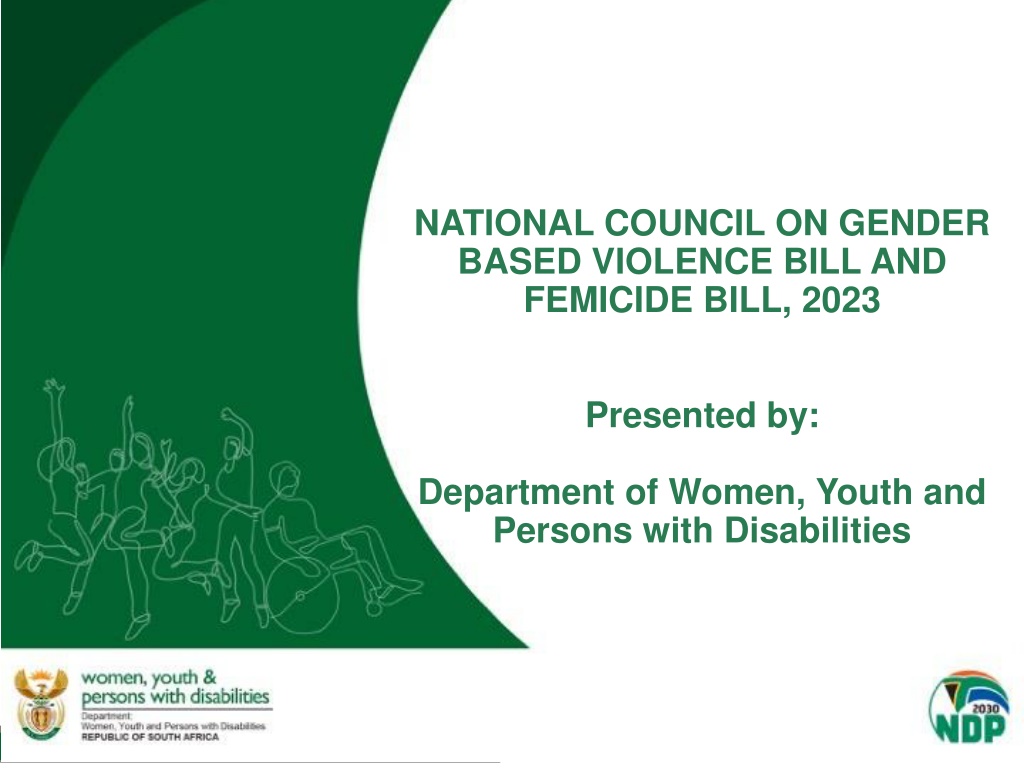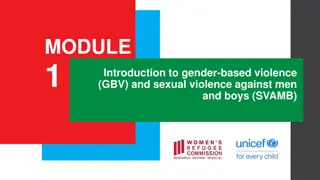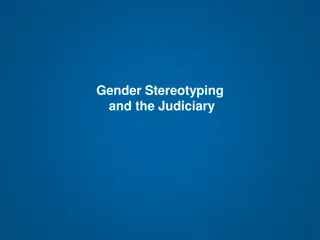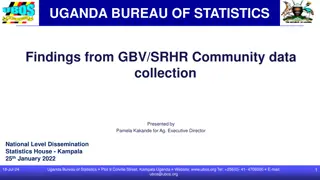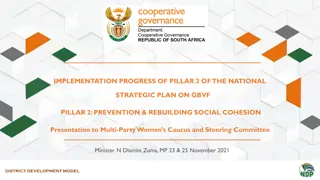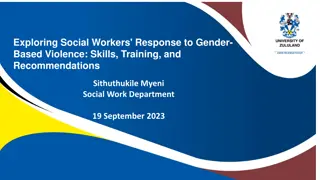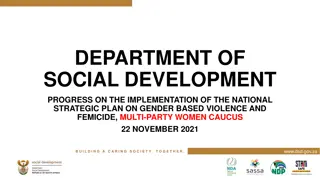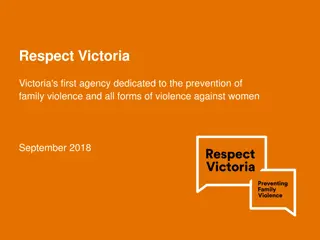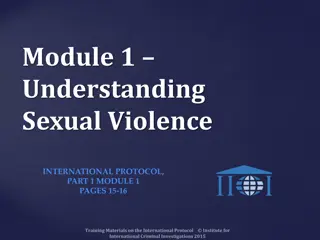National Council on Gender-Based Violence and Femicide Bill, 2023 Overview
The National Council on Gender-Based Violence and Femicide Bill, 2023, aims to establish a statutory body to lead in the elimination of gender-based violence and femicide in South Africa. The Bill aligns with the National Strategic Plan and sets out provisions for the Council's establishment, purpose, and strategic objectives. It emphasizes a multi-sectoral approach and national commitment to combatting gender-based violence.
Download Presentation

Please find below an Image/Link to download the presentation.
The content on the website is provided AS IS for your information and personal use only. It may not be sold, licensed, or shared on other websites without obtaining consent from the author. Download presentation by click this link. If you encounter any issues during the download, it is possible that the publisher has removed the file from their server.
E N D
Presentation Transcript
NATIONAL COUNCIL ON GENDER BASED VIOLENCE BILL AND FEMICIDE BILL, 2023 Presented by: Department of Women, Youth and Persons with Disabilities 0
PURPOSE The Minister of Women, Youth and Persons with Disabilities submitted the National Council on Gender Based Violence and Femicide Bill,2023, ( the Bill ) with the intention to introduce it in parliament in terms of section 73 of the Constitution of the Republic of South Africa, 1996, ( the Constitution ). The purpose of this presentation is to brief the Commitee about the provisions of the Bill. 1
BACKGROUND The Bill seeks to establish a statutory body to be known as the National Council on Gender-Based Violence and Femicide ( the Council ) in line with the National Strategic Plan on Gender Based Violence and Femicide ( the NSP ) that was approved by the Cabinet during March 2020. The main objective of the Council is to provide strategic leadership and political guidance towards the elimination of gender based violence and femicide in South Africa. According to the NSP, the Council will be legislated and derives its mandate from the Constitution, International and Regional Instruments (CEDAW, Maputo Protocol); Cabinet Instruction, 2012; and the Declaration of the Presidential Summit on GBVF, 2018. 2
PROVISIONS OF THE BILL Clause 1 of the Bill consists of definitions. Clause 2: provides that the purpose of the Bill is To provide for the establishment of the Council as a statutory body, which acts through its Board and is responsible for providing strategic leadership on the elimination of gender-based violence and femicide in South Africa; to provide for a multi-sectoral and an inter-sectoral approach towards the implementation of the National Strategic Plan on Gender Based Violence and Femicide; to affirm a national commitment to building a society that is free from all forms of gender-based violence and femicide. 3
PROVISIONS OF THE BILL Clause 3 provides that the Council is statutory body responsible for providing strategic leadership for the elimination of gender based violence in South Africa in terms of the NSP; and acts through its Board. Clause 4 sets out the objects of the Council which, amongst others, are: to facilitate a coordinated multi-sectoral approach between the State and civil society for the prevention of, and response to gender based violence; and to set short- term, medium term and long term priorities, aligned with the National Development Plan outcomes, Medium Term Strategic Framework and Medium Term Expenditure Framework priorities and the NSP. Clause 5 provides for the development of an Action Plan for the implementation of the National Strategic Plan, not later than six months after the establishment of the Council, in order to achieve the purpose of this Act. 4
PROVISIONS OF THE BILL Clauses 6-14 provide for the composition of the Board and all related matters. The Board shall consist of a maximum of 13 members of whom seven must be from civil society structures; six representatives from relevant government departments; and the Executive Officer, who is an ex-officio member of the Board without voting rights. Clause 15 provides for the appointment of the Executive Officer, who is an employee of the Council and is accountable to the Board. The Executive Officer holds office for a period of five years and may be re-appointed for one additional term of office not exceeding five years; and receives the remuneration, allowances and other service benefits as the Board may determine. 5
PROVISIONS OF THE BILL In terms of clause 16, the Chief Executive Officer must actively manage the business affairs of the Council by, amongst others; obtaining and allocating resources consistent with the strategic objectives, and make timely adjustments in strategies when conditions and circumstances change. In addition, the Chief Executive Officer must carry out a comprehensive budgeting process and monitor the Council s performance against the budget. Clause 17 provides that the Chief Executive Officer is the Head of the Secretariat of the Council; and must, in consultation with the Board appoint and supervise the staff of the Council. The conditions of employment and remuneration of the Executive Officer and the staff of the Council are determined by the Board in consultation with the Minister and the Minister of Finance. 6
PROVISIONS OF THE BILL Clause 18 provides for the funds of the Council which consist of monies appropriated by Parliament; donations or contributions received from any source; trust funds vested in it; interest derived from investments; and money received from any other source. Whereas clause 19 provides that the financial management of the Council is the responsibility of the Chief Executive Officer. Clause 20 provides that the accounts and balance sheet of the Council must be audited in terms of the Public Audit Act, 2004. Clause 21 limits the usage of the name, acronym, logos, designs and material used or owned by the Council, to the Council unless written authorization is obtained. 7
PROVISIONS OF THE BILL Clause 22 empowers the Minister, after consultation with the Board, Premiers and Mayors in the provincial and local spheres of government, to prescribe norms and standards for the establishment of the provincial and local gender based violence structures. Clause 23 gives the Minister powers to delegate some powers conferred to the Minister by the Act and certain duties to the employees of the Council, members of the Board and a committee of the Board. Clause 24 provides that the Minister may, after receiving recommendations from the Board make regulations on matters relating to the implementation of this Act. Clause 25 is the name of the Act and commencement details. 8
